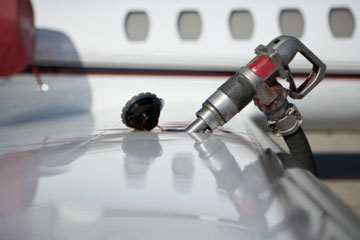Researchers have developed a catalytic process for converting sugarcane biomass into a new class of aviation fuel and lubricant base oils that could help bio-refineries achieve net life-cycle greenhouse gas savings of up to 80 percent.
Global climate change problem is simple to understand. Molecules of carbon and other greenhouse gases absorb heat. The more greenhouse gases emitted into the atmosphere, the warmer the atmosphere becomes, exacerbating global climate change. Solving the problem is not so simple, especially with regards to aviation – the source of two-percent of the annual greenhouse gas emissions from human activity. While bio-fuels have proven to be effective, renewable, low-carbon alternative to gasoline and diesel, jet fuels pose unique challenges.
Researches developed recyclable catalysts which are capable of converting sugarcane biomass into a new class of aviation fuel and lubricants with superior cold-flow properties, density and viscosity that could achieve net life-cycle greenhouse gas savings of up to 80-percent.
The concentrations of carbon and other greenhouse gases in Earth’s atmosphere are now at their highest levels in the past three million years, primarily as a result of the burning of petroleum and other fossil fuels. Biofuels synthesized from the sugars in plant biomass help mitigate climate change. However, jet fuels have stringent requirements that must be met.
Jet fuels must be oxygen-free, have the right boiling point distribution and lubricity, and a very low pour point, meaning the fuel can’t become gelatinous in the cold temperatures of the stratosphere. Biofuel solutions, such as carbon extracts from sugarcane, mixed directly with petroleum jet fuel have been tested, but they offer only modest greenhouse gas reduction benefits. This was the first process to generate true drop-in aviation biofuels.
Researchers debate on dependency on petroleum and point out that biofuels are the only viable alternative to conventional jet fuels. They further believe that air travel is going to require renewable liquid fuels because batteries and fuel cells simply aren’t practical.
The innovated renewable process require to selectively upgrade alkyl methyl ketones derived from sugarcane biomass into trimer condensates with better than 95-percent yields. These condensates are then hydro-deoxygenated into a new class of cycloalkane compounds that contain a cyclohexane ring and a quaternary carbon atom. These cycloalkane compounds can be tailored for the production of either jet fuel, or automotive lubricant base oils. Lubricant base oils can produce even more greenhouse gas emissions on a per-mass basis than petroleum-derived fuels if even a fraction of the lubricant is repurposed as fuel. The ability of the process to yield jet fuel or lubricants should be a significant advantage for bio-refineries.
Sugarcane bio-refineries today produce ethanol, sugar and electricity. Expanding the product slate to include aviation fuels and lubricant base oils could allow operators to manage their market risks better, which is exactly how petrochemical refinery complexes operate today. Rather than optimize for one product, they try to optimize the overall product slate.
Another important advantage offered by this renewable process is that it enables refineries to convert a portion of the bagasse, the fibrous residue that remains after juice is extracted from sugarcane stalk, into fuels and other products. The rest of the waste biomass can be combusted to produce process heat and electricity to operate the refinery. This new process for making jet fuel and lubricants could also be used to make diesel and additives for gasoline.
With some minimal modifications to both the catalysts and the reaction schemes, diesel can be produced as well. Bio-refineries can use inexpensive catalysts to produce a suite of hydrocarbon fuels and lubricants. By strategically piecing together biological and thermochemical processes, bio-refineries can also operate without any fossil-derived inputs.

